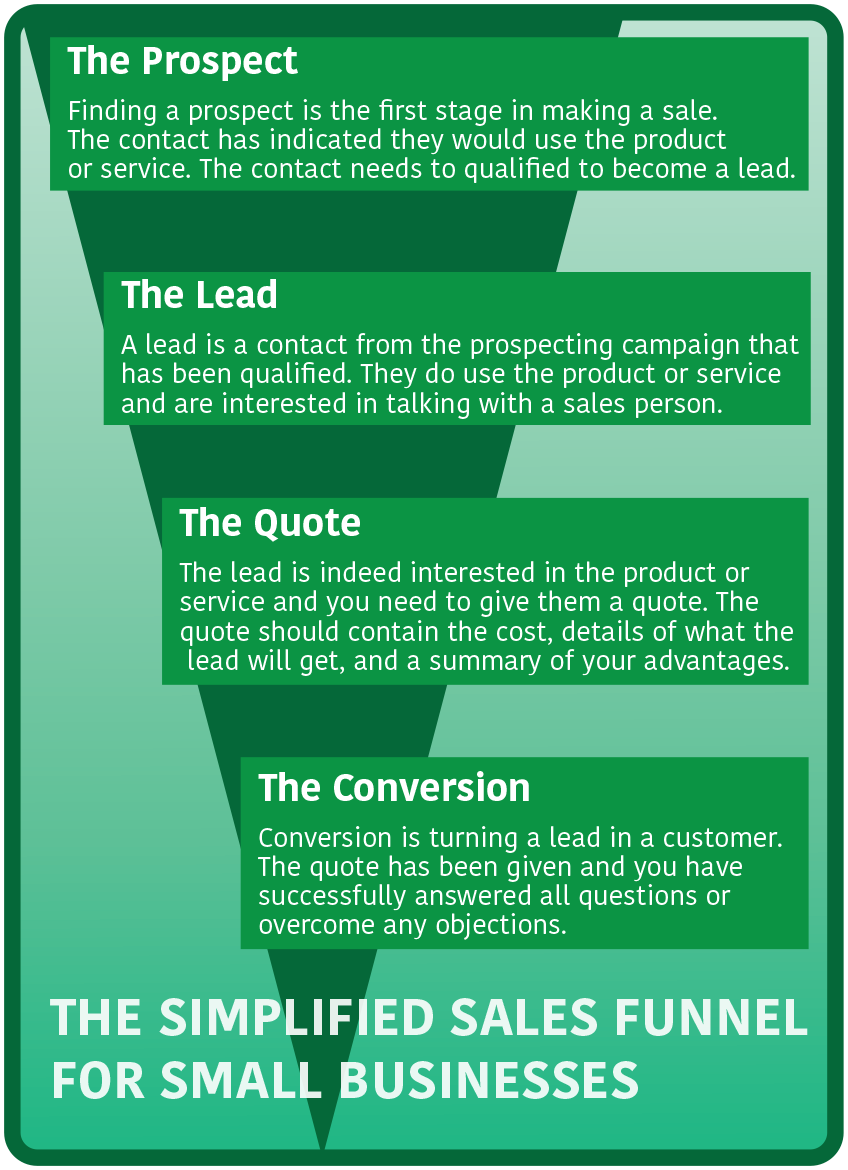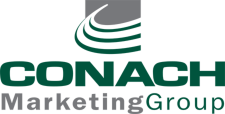The sales funnel for small business marketing
The Small Business Marketing Sales Funnel
Ah, the sales funnel – a visualization for the lead generation and sales process that can be quite complex for many B2B marketing programs. I have seen clients break it into incremental steps. Of course, this could be necessary if your sales process is highly-detailed. For most small business owners, complicating the sales process is not a good thing. Complicated takes time they may not have. For this reason, let’s look at a simple sales funnel for small business marketing. It will cover four basic areas
Prospect
The initial step in finding a potential lead.
Lead
This stage qualifies a prospect as a lead.
Quote
The part where the opportunity becomes a chance for a sale.
Conversion
This act is closing the sale.
The Prospect in the small business sales funnel
Clients often ask me the difference between a prospect and a lead. Generally speaking, they can be interchangeable. However, I think you should make a distinction sales funnel for small business marketing. Let me explain. A prospect is a person that indicates they could use your product or service. To be a lead, they must be qualified that they actually do use it – more on that later.
Often in the client prospecting campaigns we conduct, we cannot get past the gatekeeper, no matter how persuasive our caller. In that case, the best option is asking to send the decision maker the client response material. As a result, we now have a name and a reason for following up with the said decision maker. If you can speak with them during the first call, often they don’t have time for an on-the-spot sales presentation. But if they receive information to review later, it allows you to set up the follow-up meeting.
The response material should be more of an overview of your company at this point. In some cases, it could focus on a specific target market. The key point is not to overwhelm the prospect with information. The reason for this approach is to provide enough information to be clear what your company does while still causing curiosity in the recipient to want to speak with you. The most crucial part in this stage of the small business marketing sales funnel is to get your information into the prospect hands.
The Lead in the small business sales funnel
The follow-up sales call is to determine if the prospect is an actual lead. Once you qualify that the prospect indeed uses your product or service, you have a lead. The next step is to turn that lead into a chance for a sale.
This process may take place during a phone or in-person meeting. In addition to your sales pitch, you will probably conduct a needs analysis to build the proposal. Also, you need to focus on the most critical part of this process – making a connection with the contact and aligning your solutions with their needs.
Building a relationship with the lead no longer means asking them about their hobbies. Whether you both enjoy snowshoeing is nice but matters little to a contact in today’s hectic world. Stay focused on your marketing messages. For our clients, we use messaging strategies such as Pain Point and Relief, Feature/Benefit, and Decision Drivers. This technique provides salespeople with points for establishing how you can be of value to the decision maker.
As mentioned earlier, target market material focus on a specific industry can be used as response material in the Prospect part of the funnel. However, saving a more detailed sales piece for the follow-up meeting lets you show your expertise and continue to strengthen the connection.
The Quote in the small business sales funnel
This part is where the lead becomes an opportunity for a sale. You’ve conducted the follow-up meeting to discover how you can fulfill the needs of the lead and built a quote. It is important to remember that you are not just presenting your cost for products or services. You are showing how you can resolve a challenge to their benefit. While price is always a factor, proving your value reduces the emphasis on being the lowest bidder. Another critical point is reminding the decision maker why they wanted you to provide a proposal in the first place. A review of your strengths and advantages can set you apart and give you an edge over competitors in this stage of the small business marketing sales funnel.
Once you’ve presented your proposal, re-emphasized your strengths, and shown your value, there is one more step. You should always establish next steps and set a follow-up meeting to close the sale.
The Conversion in the small business sales funnel
The Conversion part of the small business marketing sales funnel is the best part. That’s because it’s when you make the sale. In a perfect world, this is also will be the easiest part. The decision maker likes the solution you’ve provided and agrees with the price.
In reality, it’s not always that simple. Even if you are not competing against multiple bids, the potential customer might not be willing to spend the money or see the merits of your solution. Because of this possibility, you need to be prepared to offer answers to any and all objections. In addition, don’t be afraid to “ask for the sale.” If plenty of time has passed for the decision maker to contemplate your proposal, and you’ve remained silent during that time, ask if they are ready to move forward.
If for some reason they aren’t, and you’ve exhausted your “overcoming objection” skills, don’t give up. Ask when you can follow up or what are the next steps. Converting a sale can take months if there is no urgency for the decision maker. Keep in mind all the effort it has taken to get to this point of the small business marketing sales funnel and don’t let the sale die easily. The reason it is a funnel is that you need to start with several prospects to work your way down to a customer, but it’s an essential part of any small business B2B marketing program.
About the Author
Paul Kowalski (or Pappy as he is called around the office) spent over two decades working at other agencies before opening Conach Marketing Group in 2008. The early part of his career was working with Fortune 500 clients at different agencies. However, working with smaller clients was his preference. This choice was because of the impact on a client’s business growth and the forming closer, personal relationships.
When he was creating Conach, his goal was to bring those Fortune 500 strategies along with years of B2B marketing experience to small business marketing clients. As a result of focusing on business to business marketing, Conach specializes in construction marketing, financial marketing, and industrial marketing. Even though we are in Mid-Michigan, Conach provides marketing services to clients across the country.
For more information visit conachmarketing.com or contact us or call 989.401.3202.

